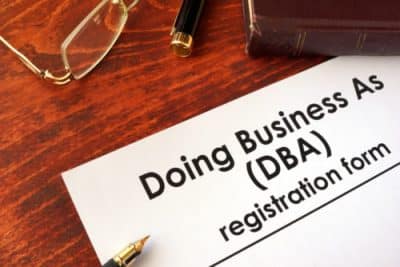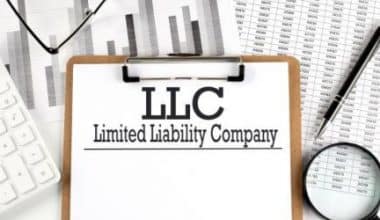If you’re starting a business for the first time, you’ll need to make some essential legal decisions. However, you are (probably) not a lawyer, and you may be uncomfortable with all of the legal terminology and acronyms that are thrown around, from deciding whether to form an LLC or a sole proprietorship to file a DBA.
This article will concentrate on the acronym DBA. Registering your DBA does not legally protect your business, but it may be required based on the state, city, or county in where you operate, as well as the kind of your business.
Below, we’ll delve more into the significance of a DBA, whether your business requires one, and a few more reasons why filing a DBA name is a smart idea for any business.
What is a DBA?
DBA is an abbreviation for “doing business as.” A DBA is any registered name under which a business works that is not its legitimate business name. A DBA may also be referred to as a trading name, fictional name, or assumed name.
A DBA is not a business structure and does not provide personal asset protection in the same way that an LLC or corporation does.
Filing for a DBA allows you to conduct business under a name other than your own; your DBA is distinct from your name as the business owner or the legal, registered name of your business. This is due to the fact that when you start a business, the legal name of the business defaults to the name of the person or organization that owns the business. That is unless you register your business as a specific legal entity (more on that below) or rename and register your business with a DBA.
So, if Laura Smith wants to create a tech repair business, she will do so under her own name unless she registers her DBA as “Laura’s Tech Repair Shop”. Laura’s full name is not legally associated with the name of her business after registering her DBA.
Keep in mind that, depending on where you live, you may be required to follow your state’s DBA regulations.
Why Would I Require a DBA?
There are numerous reasons why a firm could require a DBA name. Kayla, for example, has a sole proprietorship for her marketing services, and the firm name is her full legal name. But what if Kayla wishes to provide her services under the alias “KaylaWrites” in order to safeguard her identity? She can accomplish this by obtaining a DBA name, which will allow her to market her services under a different corporate name.
While “doing business as” names are useful for single proprietorships, they are also useful for other types of businesses, such as LLCs and corporations. Here are a few reasons why a corporation might desire to get a DBA name:
- Registering a Domain Name
When the domain you desire is unavailable, you may have to sell your services under a different name. For example, suppose the owner of “Sharpest Tools, LLC” chooses to construct a website but is unable to acquire their LLC name as the domain name. They instead register the domain “LocalTools.com”. They obtain a DBA name for “Local Tools” in order to sell under this brand.
- Expanding into Additional Services
You may establish a corporation to provide one service or product only to expand in another direction later on. For example, if your company, “Luna’s Locks, Co”. provides hair care products and supplements, you may not want to sell your vitamin and supplement line under the same name. Instead of forming a new firm, you can obtain a “doing business as” name and sell these things under a different name.
What kind of Business Requires a DBA?
DBAs are not required in all businesses. It is determined by a mix of the legal entity of the business, the needs of the location, and the choice of the business owner.
#1. Partnerships and Sole Proprietorships
If you’re a sole proprietorship or general partnership, you must register a DBA if you want your company to operate under a name that isn’t your or your business partner’s complete legal name. Because sole proprietorships and general partnerships are unincorporated, they are not required to file entity formation paperwork or choose a business entity name with the state. (However, they must still obtain the proper business licenses and permits.)
As a result, the owners and their businesses are one and the same thing, which means they have the same name until they register a DBA.
#2. Franchises
While franchise owners are not required to obtain a DBA, it is typical for them to do so in order to establish their identity as a local business. Assume you purchased a local Burger King franchise. Franchisees typically register as LLCs or corporations. So you form a franchise under 123 Business LLC, but your DBA is “Burger King” to notify your state that you are “doing business as” the franchise you joined.
#3. Other types of legal entities
Corporations (including S corporations and C corporations), limited partnerships, and limited liability companies, or LLCs, do not need to file a “doing business as” name unless the state, city, or county demands it. These business kinds, unlike sole proprietorships and general partnerships, have previously registered their companies and business names with the state.
Any business founded under one of these companies, however, has the option of registering a DBA name. This would enable them to conduct business under a name other than the one shown on their incorporation records.
The most typical reason for a corporation or LLC to register a DBA name is to have an additional name for a certain line of business. The corporation does not have to start a new business only to operate under a different name by filing a name for a new branch of the business. For example, John’s Cosmetics Inc. may want to call its new skincare line “John’s Skincare Solutions”. This saves an expanding business both money and the time required to start a completely new business under a separate LLC or corporation.
Also, if you register a DBA without first forming some kind of legal structure, your state will automatically recognize your business as a sole proprietorship.
Read Also: Bespoke Tranche Opportunities 2023: Definition and all you need to Know
Do I require a DBA?
It is not necessary to have a DBA to start or run a business. A DBA is a false or assumed business name that is occasionally used for branding purposes by sole proprietors, partnerships, LLCs, and corporations.
There are only two reasons why you would require a DBA:
- You have a formal business entity that is wanting to expand into new products, services, or brands, or to rebrand in general.
- You own an unregistered business, such as a sole proprietorship or partnership, and want to use a name other than your own. Only businesses with very low profit and risk should utilize this option.
Common DBA Misconceptions
DBAs are frequently confused with a kind of business structure by first-time entrepreneurs. They believe that by registering a DBA, they are establishing a formal business structure with liability protection; however, this is not the case.
When an entrepreneur begins a business and simply registers a DBA name, they are essentially forming a sole proprietorship with a DBA name.
The DBA name helps with banking and branding the business, but the business owner’s personal assets are still totally vulnerable to litigation and creditors.
What are the Benefits of a DBA?
The advantages of using a DBA differ according to the sort of business structure you have.
DBA Advantages for Sole Proprietors and Partnerships
While registering a DBA name for a single proprietorship or partnership is beneficial for branding, it lacks the most critical benefit—personal liability protection.
For a business owner who expects to make a profit or take any risks, forming an LLC or corporation is the ideal option. In the event that your business is sued or unable to pay its creditors, LLCs and corporations can protect your personal assets.
Using a DBA name for a sole proprietorship has three major advantages:
- Branding Expansion
- Enhanced Privacy
- Small Business Banking Access
#1. Branding
A lone owner or partnership that does not have a DBA must conduct business under their own name (s). By default, a sole proprietor’s personal name serves as their business name.
With a DBA, “John Smith” can promote himself under a fictitious name such as “Advanced Photography.”
More information on branding can be found in our How to Name Your Business guide. Our business name generator and logo maker can help you brand your business.
#2. Privacy
When you file a DBA name, the general public only sees your bogus business name and not your surname.
#3. Banking
You can collect payments in the name of the company rather than your surname. This might help to build trust and credibility.
DBA Advantages for Corporations and LLCs
To employ a brand name, bank in the LLC name, or create privacy, formal business structures such as LLCs and corporations do not need to file a DBA name. These are standard features of those business models.
The most significant advantage is that DBAs enable formal business entities to develop many brands (business names) or lines of business under a single LLC or corporation. They can also be used to rebrand an LLC or corporation instead of changing the primary legal business name.
Example of an LLC DBA:
If the owner(s) of “Babe’s Hardware, LLC” decided to expand into furniture sales and restoration, they may apply for the trade name “Babe’s Furniture”. This would enable them to market the business as a furniture store and take payments under the name “Babe’s Furniture.”
Registering a DBA
You’ll need to register for a DBA name once you’ve decided you want one. Typically, registering a DBA name is a simple process, but the steps can differ from state to state. In most circumstances, you’ll take the three actions outlined below:
#1. Initial DBA Name Search
Do you recall when you registered your company name? You had to spend some time choosing the ideal name and then checking online to see if it was available. The same is true when it comes to obtaining a “doing business as” name. To begin, make a list of potential names that fit your brand. Once you’ve completed these steps, go to your state’s Secretary of State’s website (in some cases, the Commonwealth of State website). Search into your state’s business name database and look up your list of names to see if any of them are available.
Once you’ve narrowed down your options, conduct a quick domain search to see if any are available for purchase. Based on the results of your search, choose the best “doing business as” name.
If you aren’t ready to register your DBA name right away, you might want to explore reserving your DBA name online or by mail. Most states charge for this service but keep your name on file for 120 days.
You should also think about trademarking your DBA name. So, you can also file for trademark registration at the state and federal levels. You should look into any existing trademarks on your name in the United States Patent and Trademark Office (USPTO) database. While federal registration of a trademark often provides broader rights, state registration of a trademark is frequently easier and faster. You can usually check a state-level database. If your name is clear, you can register a trademark on your DBA name in the state where you’ll be doing business.
It is important to note that some states have special laws for company names, such as terms that cannot be included in your name. Before agreeing to a DBA name, make sure to check your state’s rules.
#2. DBA Name Application Filing
Once you’ve decided on a DBA name, you’ll need to file the necessary papers to register your name. In certain areas, this is not referred to as a DBA name, but rather as an application for an assumed name, fictitious name, or trade name.
You can locate this form on the website of your Secretary of State or Commonwealth of State and submit it online. You can also submit an application for a DBA name via mail. Most states charge a filing fee for this application.
You will need your DBA name and your company’s Employer Identification Number to complete this application (EIN). If you are an LLC or sole proprietorship without an EIN, you must use your Social Security number. You may also be required to provide your company’s official name.
#3. Publication of the DBA Name
The final stage is not applicable in every state, although it is necessary in California, Florida, Georgia, Illinois, Minnesota, Nebraska, and Pennsylvania. In these states, you must publish your DBA in local newspapers.
The specific rules vary by state. However, you’ll be expected to publish your company’s DBA name once a week for four weeks. This may necessitate the publication of an advertisement or a statement that includes your company’s name, contact information, and DBA name.
How to File a DBA Name
DBA regulations differ depending on the state, county, city, and business structure. In general, registering a DBA requires documentation and filing fees ranging from $10 to $100. You’ll either go to your county clerk’s office or your state government to file your paperwork.
In some areas, you may also be required to post a fictitious name ad in a local newspaper for a set period of time. This satisfies several states’ “public notice” requirements by officially announcing your business name to the local community.
There is one practical constraint to keep in mind. Your “doing business as” name cannot include a corporate ending such as “Inc,” “LLC,” or “Corp”. This gives the idea that your business is a corporation or has some kind of corporate standing when it doesn’t.
Aside from that, there are no restrictions on what you can use as a “doing business as” name. However, it’s usually preferable to conduct a quick business name search within your area to ensure that no other business is using your DBA name.
Tips for Filing a DBA
Now that you know how to register a DBA, let’s look at a few DBA-related facts:
- A certificate of good standing is usually required to obtain a DBA as an LLC or company.
- Some states accept online payments, however others may demand a money order or cashier’s check. Furthermore, some states allow you to file your papers online, while others require notarized documentation.
- If you operate under an assumed name that has not been registered, your state regulatory office may levy hefty fines.
- In many states, you must renew your license after a certain period of time. Keep track of when you need to renew your DBA. Letting it lapse might have a negative influence on your business’s marketing.
- Certain states also require you to submit a new DBA if any of the information in the initial filing changes, such as a change in officers (for a corporation), partners (for a general partnership), or members (for an LLC). It’s worth noting that in some states, you can simply file an addendum in these situations.
- In most circumstances, hiring a business attorney to assist you with filing is unnecessary. The procedure is straightforward enough that most business owners can complete it on their own. If you’re unsure about the process or have a more complex business scenario, it’s always a good idea to seek professional assistance.
What is the Cost of a DBA?
You’ll have to pay a few different fees, such as registering your DBA with the state, reserving your DBA name, trademarking your DBA, obtaining a domain name, and publicly advertising your DBA name. It is important to note that these costs will vary greatly depending on your state and whether you file online or by mail. Your DBA name will also expire after a specific amount of time. So, you will need to renew it at an additional cost if you intend to continue using it.
How Long Does it Take to Get a DBA?
In some situations, a “doing business as” name filing is necessary within a certain amount of time after you begin using the name (usually within 30 to 60 days). How long does it take to register a DBA? With a few exceptions, most DBA name filings take one to four weeks, depending on the jurisdiction.
Is a Separate Bank Account Required for a DBA?
No, a separate bank account is not required for a DBA operating under an LLC. If your DBA is for a sole proprietorship, you need to open a separate business bank account.
Which is Preferable, a DBA or an LLC?
The decision between obtaining a DBA for your sole proprietorship/partnership and forming an LLC is based on the specific scenario and demands of your business. In the short term, operating a sole proprietorship under a DBA name is a simpler and more cost-effective alternative. However, an LLC provides VERY significant benefits such as personal liability protection.
Different Methods for Registering your Business’s name.
#1. Name of the entity
An entity name can safeguard your business’s name at the state level. The state may require you to register a legal entity name depending on your business structure and location.
The entity name is how the state identifies your business. Each state may have distinct restrictions about what your entity name can be and how business suffixes can be used. Most jurisdictions prohibit you from registering a name that has already been registered by another person. Some states need your entity name to match the type of business it represents.
In most circumstances, registering your entity name protects your business and forbids anyone else in the state from using the same entity name. There are, however, exceptions relative to the state and business structure.
Check with your state to see what the rules are for registering your business name.
#2. Trademark
A trademark can protect the name of your business, its products, and services on a national scale. Trademarks restrict others in the same (or comparable) industry from using your trademarked names in the United States.
For instance, if you were an electronics firm and wanted to call your company Springfield Electronic Accessories and one of your items Screen Cover 5000, trademarking those names would prevent other electronics companies or comparable products from using those names.
Businesses in every state face trademark infringement litigation, which can be expensive. That is why you should cross-reference your potential business, product, and service names with the official trademark database maintained by the United States Patent and Trademark Office.
#3. DBA (doing business as) name
You may be required to register your DBA, also known as a trade name, fictitious name, or assumed name, with the state, county, or city in where your business is located. Although registering a DBA name does not provide legal protection in and of itself, most jurisdictions require you to do so if you use one. Some business models necessitate the employment of a DBA.
Even if you are not obligated to register a DBA, you may wish to do so. A DBA allows you to conduct business under a different identity than your own personal name or the name of your legal business entity. Obtaining a DBA and a federal tax ID number (EIN) also permits you to open a business bank account.
In one state, multiple businesses can use the same DBA, so your options are more open. There is also more leeway in terms of business function clarity. A small business owner, for example, could use Springfield Electronic Accessories as their entity name but TechBuddy as their DBA. Just keep in mind that trademark infringement rules will continue to apply.
Based on your specific region, determine your DBA requirements. Requirements differ according to the type of business as well as the state, county, and municipality. So, verify with local government offices and websites.
#4. The Domain name
Start by registering a domain name. It’s commonly known as your website address, or URL — if you want your business to have an online presence.
No one else can use your domain name after you register it for as long as you control it. It’s a wonderful strategy to safeguard your brand’s internet presence.
It’s fine if someone else has already registered the domain you’d like to use. It is not necessary for your domain name to be the same as your formal business name, trademark, or DBA. Springfield Electronic Accessories, for example, might register the domain name techbuddyspringfield.com.
A registrar service will be used to register your domain name. Consult a directory of licensed registrars to establish which ones are safe to use. Then, choose the one that provides the best value for money and customer service. Your domain registration will need to be renewed on a regular basis.
What are the latest trends and advancements in database administration?
Recent developments and trends in database management include the proliferation of cloud-based databases, the elevating profile of data privacy and security, the expansion of big data and the Internet of Things (IoT), and the application of AI and ML to database optimization and management. Increased focus on data governance and management has also contributed to a need for DBAs versed in NoSQL and other non-relational data stores.
How can organizations ensure the performance and security of their databases?
Regular backups and recovery procedures, security measures like encryption and authentication, regular database performance tuning, and keeping up with the latest software and security patches are all ways in which businesses can ensure the performance and security of their databases. Another option for businesses is to hire external DBAs who can manage and maintain their databases efficiently.
What are the benefits of outsourcing DBA services?
Businesses can gain a lot by outsourcing DBA services, including financial savings, access to expert knowledge, increased productivity and dependability, and better database performance and security. In addition to providing organizations with more adaptability and scalability in managing database systems, outsourcing DBA services can free up internal resources to focus on other critical business functions.
What is database testing and why is it important?
The term “database testing” refers to the process of analyzing a database’s efficiency, effectiveness, and dependability. It’s crucial for making sure the database is up to snuff and serving the business’s needs, as well as that it can scale to accommodate a lot of data and transactions without compromising on speed or steadiness. Database testing is important because it helps find and fix problems with the database before they escalate, which in turn helps maintain data integrity and security.
Conclusion
Filing a DBA name isn’t difficult; you just need to work within your state or county’s criteria to do it correctly. It’s normally ideal to do all of this before operating under your planned “doing business as” name, which should be between 30 and 60 days before you open your doors.
Depending on your jurisdiction, you should receive permission within one to four weeks. Once you’ve received approval for your DBA name, you’re ready to begin operating your business. This means you may open your doors, accept new clients, and open your business bank account.
Following that, make sure you’re staying compliant by operating under your business name. Also, check with your state government offices to see if you need to renew your license annually.
DBA FAQ’s
How does a DBA work?
Registering for a DBA allows you to conduct business under a fictional name rather than your own. To open a business bank account, your bank will require a DBA. Banks frequently demand sole proprietorships and general partnership participants to establish a DBA before opening a business bank account.
What is a DBA example?
For example, John Smith, the proprietor of a business, may file the Doing Business As name “Smith Roofing.” DBA names can be registered by corporations and limited liability companies (LLCs) for certain lines of business. Helen’s Food Service Inc., for example, could register the DBA “Helen’s Catering.”
Does a DBA need an EIN?
This is due to the fact that an EIN is utilized for tax purposes, and your business is the entity that pays taxes. Because your DBAs are simply business nicknames, you won’t need a different EIN for each one. An EIN is not required for all businesses.
How do I write DBA?
The right way to write your DBA legal name is to write your “doing business as” name exactly as you register it with the Secretary of State. For example, if John H. Doe is a sole proprietor and wishes to operate a barbershop called “Precision Barber Shop,” he can register the name with his state.





